Gameschooling 101: How to Enjoy the Benefits & Make Learning Fun at Home
Discover the joys of gameschooling and how it can boost learning at home.
Learn about how this creative homeschool approach can help you easily make learning fun – for your kids and you! These tips, ideas, and resources will also help you get a great start to your gameschooling adventures.
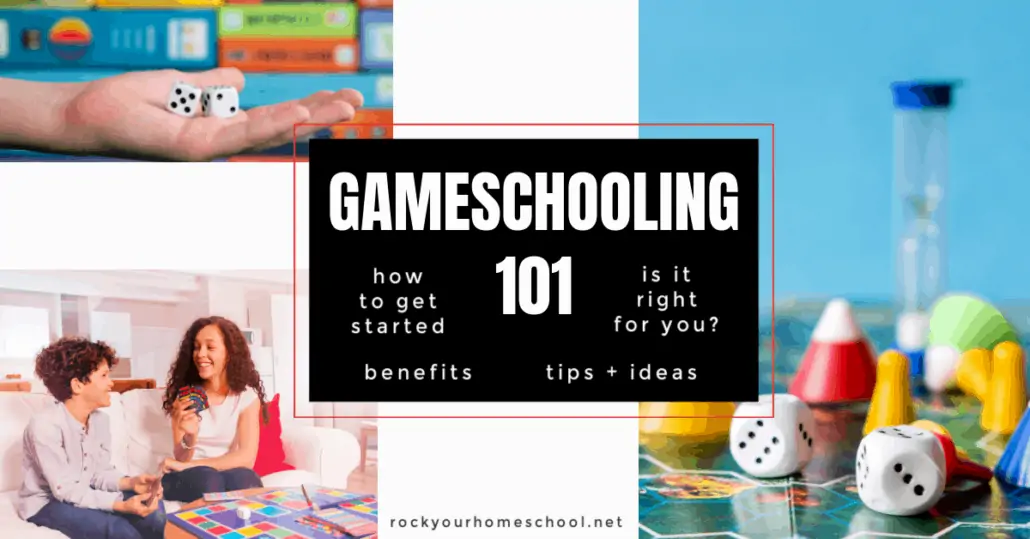
Wondering If This Homeschool Approach Will Work for You?
Have you heard the term “gameschooling” tossed around in homeschool groups and not sure what it means?
Whether you’re new to homeschooling or a veteran homeschooler, new trends and curriculums pop up all the time. It can feel almost impossible to keep up with everything!
When you hear of something new or different, you’re often left with all kinds of questions, like:
- What is gameschooling?
- Should I try incorporating it in my homeschool?
- What benefits does gameschooling offer my kids (and me) in our homeschool day?
- How can I give it a try without spending a ton of money?
These are all important questions that need to be answered before you make changes to your plans. It’s also essential to remember that what works for one family doesn’t always work for another, so don’t feel pressure to make your gameschool look like anyone else’s.
If you’re interested in incorporating games into your regular homeschool day, here’s a guide to help you find what you need to know about getting started with and using gameschooling in your homeschool.
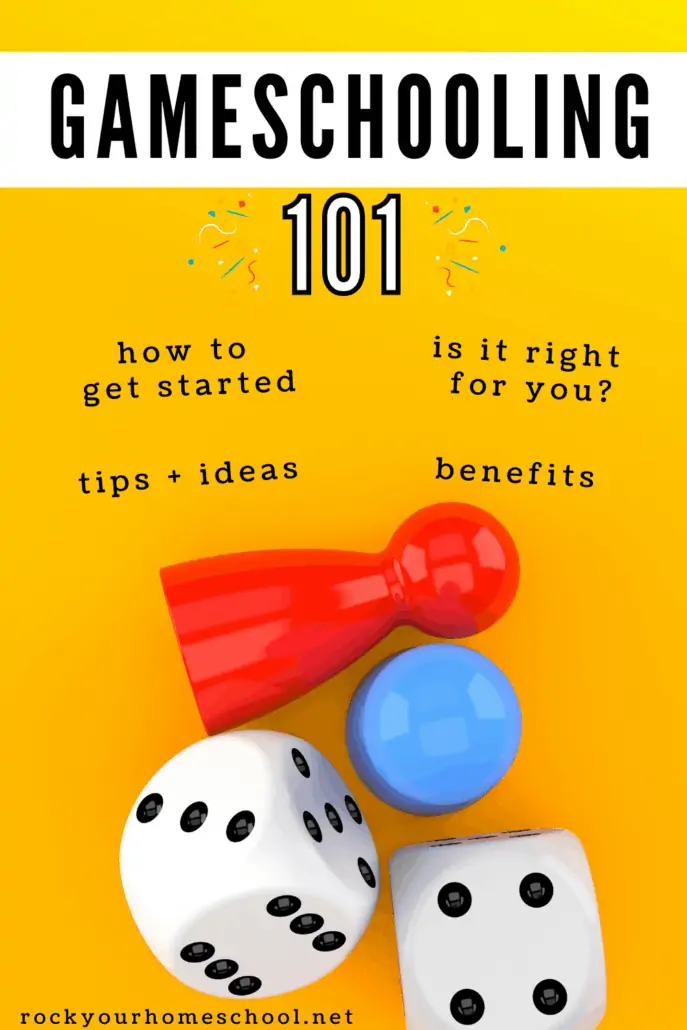
What is Gameschooling?
If you spend time in the homeschooling world, you’ll eventually see the word gameschooling tossed around, along with tons of other “schooling” words.
No one knows who created the word, but it means intentionally using games as part of your homeschool and educational philosophy. Games are more than fun – they’re educational!
Many families play board games at night or on the weekend for fun. It’s hard to find an adult who didn’t grow up playing Life and Monopoly. Gameschooling families, however, use them as a core part of their homeschooling day or week.
Gameschooling families might use math-based board games to practice necessary math skills. And they might use games to learn geography skills and facts.
You can find all sort of games for pretty much any homeschool subject you can think of!
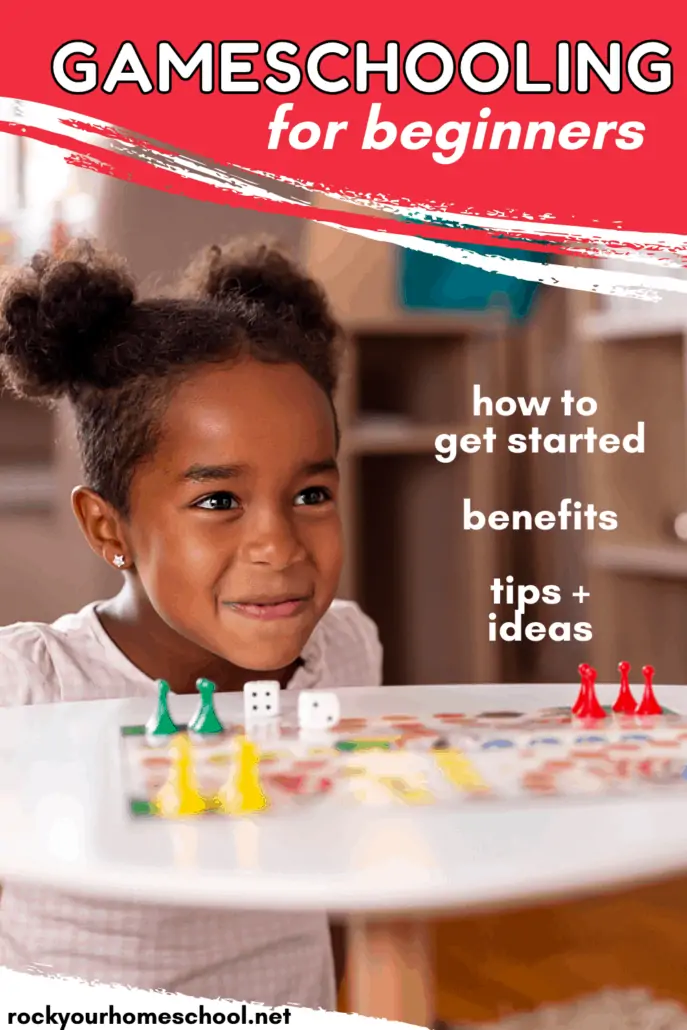
The Benefits of Using Gameschooling in Your Homeschool
Gameschooling has many benefits in your homeschool. You might, however, be skeptical about adding this type of learning into your homeschool day.
How can board games teach kids? You might be surprised at all the different ways you can learn with games!
- It’s Fun!
Why do you play board or card games? They’re fun activities!
Most people think that something fun couldn’t possibly be educational, but that’s far from the truth.
Traditional education might not feel fun, but showing your kids that learning does’t have to be miserable or boring is essential, especially if you want to encourage your kids to be life-long learners.
You can make anything fun (or add elements of fun) to education. For example, going to the zoo for a homeschool field trip and watching documentaries about animals are great ways to learn about different mammals.
If your child is having fun and learning at the same time, that’s a win-win for everyone!
- Games Help Build Skills
Games of all types can help teach and build skills – if you want them to do so.
There are dozens of math-based games that work on skills from counting to fractions and multiplication. Other games work on phonics and reading, while others are based on history and geography.
Not all games build skills, and even those that could don’t have to unless you focus on specific skill development.
- Work on Social Skills
No one likes a sore loser. And games can help kids learn how to appropriately deal with losing and winning.
Kids who frequently play games understand that they can’t always win – even if they want to win. The more opportunities kids have to play games, the more they learn how to win and lose graciously.
Gameschooling also helps with other social skills (much of which are growth mindset-based), like:
- Communication
- Assertiveness
- Cooperation
- Collaboration (for games that allow teams or groups)
- Patience
- Empathy
- Resilience
- Games Help Create a Positive Family Atmosphere
Looking for a fun way to bring your family together? Give different types of games a try!
If your family learns to love playing games, it’s something that you can do together for years to come.
Remember, even if you decide to give gameschooling a try, not all games you play have to be educational.
For example, you might play an educational game or two together during your homeschool day, then play a fun one after dinner.
- Kids Get Fun Practice with Logic
Have you ever played a strategy game? If so, you know that you have to think critically, analyzing what the other players might do next, and try to outsmart them.
Logic and strategy games exercise your brain – fantastic practice for critical thinking skills!
Games often offer kids a different way to think. Plus, it’s perfect for practicing problem-solving skills, too!
- Games Are Less Pressure
Do you think your child feels more pressure when they’re taking a written test or when they’re playing a board game with you?
You can actually use games to assess what your child is learning and retaining.
If your child is working on addition, play a game that uses this skill. You can watch your child’s progress without your child even knowing it! Tests don’t have to be traditional!
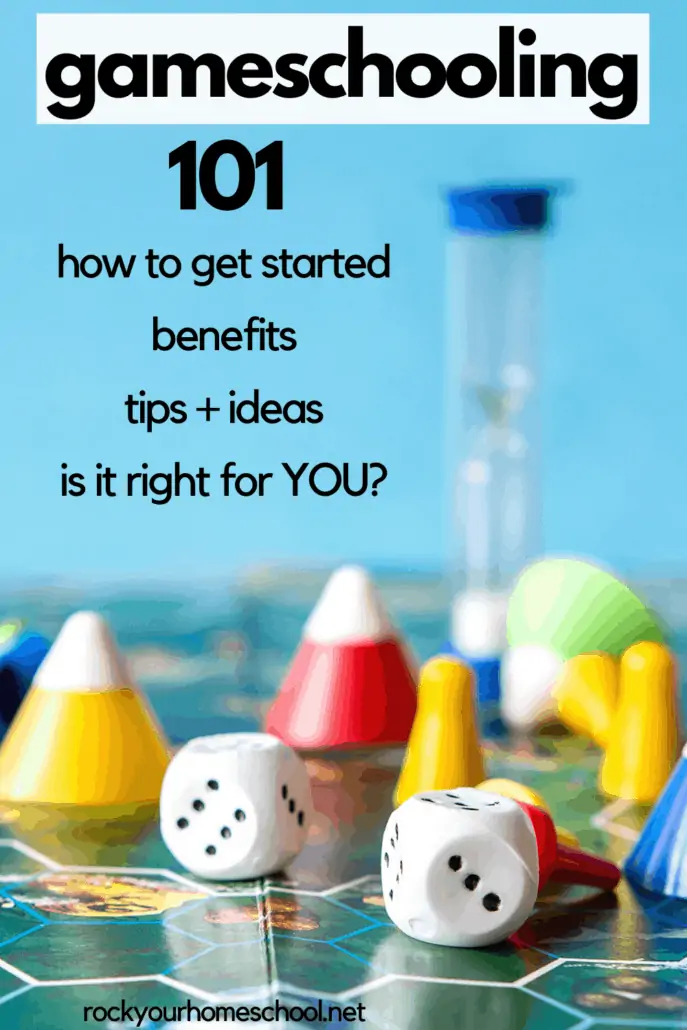
What Does Using Games In Your Homeschool Look Like?
When I tell people that we use gameschooling in our homeschool, they always want to know what that looks like in our family. Of course, it looks different for every family, so what works for us might not work for you.
Here are some of the practical ways we use gameschooling in our homeschool.
- One of my boys (Bear) learns a new concept with his homeschool math curriculum and he works through his lesson. Later, we might have a yummy treat and play a math game that uses the new math concept that he’s studying.
- My youngest boy (Xman) practices his reading lesson with me. Then, we play a sight words memory game to help him master these words. He loves sight words activities!
- We’re working on a new space unit study, so we have learning fun with several space-themed games. Before we start an activity, we play a game. And then I talk about some of the things that we’ll learn throughout the activity. Then, we play one of these games once or twice a week.
You may find that you play more games in your homeschool one week compared to another. It all depends on your schedule and what you’re learning at that time!
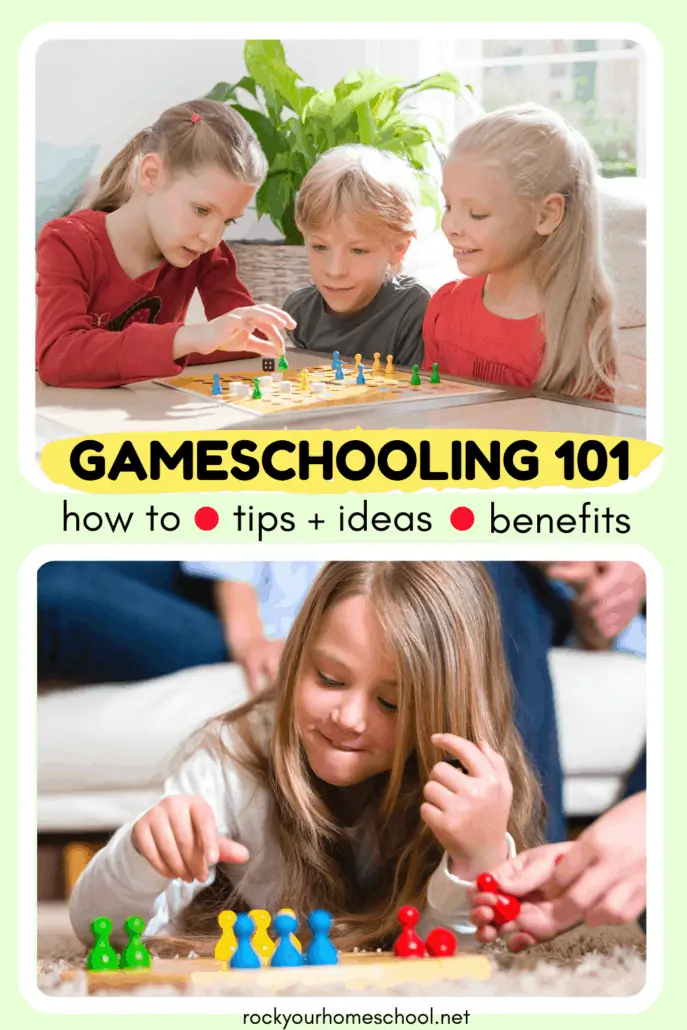
How to Incorporate Gameschooling into Your Homeschool
You may be wondering how to add games to your homeschool routine or schedule, especially if you’ve never done so before. You may find the idea of using board games as a core part of your school intimidating (like I did!) and have no idea of where to get started.
No worries! Gameschooling is fun. There’s no right or wrong way to get started. Try a few of these options and see what works best for your family:
- Family Fun Nights
One of the easiest ways to begin enjoying board games in your homeschool is to have regular family game nights.
When we got started with family game nights, we’d make pizza and play a few games together.
We’d typically start with a few easy games, like Uno and Chutes & Ladders, to incorporate younger kids who go to sleep earlier than our older kids.
Then, we’d bring out the more advanced board games. Despite an erratic schedule, we aim to have family game nights twice per month, at a minimum.
- Replace Tests & Quizzes
One of the great things about homeschooling is that you don’t HAVE to use tests – unless you want to do so. Well, unless the homeschool laws for your state require it!
Gameschooling gives you a way to see if your child is retaining skills: Do they have fewer math mistakes in this game compared to last week?
- Practice New Skills
Instead of using only worksheets or books, get creative with practicing new skills!
This type of approach is a stress-free and fun way to get plenty of practice in without making your kid frustrated.
- Use Games as an Introduction to a New Lesson
Are your kids about to learn a new concept or period in history?
One way to use gameschooling in your homeschool is to use games kind of like an ice breaker.
You can find games about all sorts of ideas, from Egyptian games to science-themed games. Chances are, you’ll find something that fits the theme!
- Combine Games with Unit Studies
Look for games that follow the theme of your unit studies.
If you’re studying space, you can find a few games that are space-themed. The games might teach kids facts about this unit study or tie in with the history period of focus.
For example, if you’re studying ancient Egypt, you might look for games that were played or still played in Egypt. This idea is a great way to explore different cultures and have fun gameschooling in your homeschool.
- Play Games at the Beginning or Ending of the School Day
Do you find that certain times of the day are more hectic or unhappy in your homeschool day than others? That’s a great place to play a game or two!
If the morning time is difficult, you could try an easy game over breakfast to help everyone start the day off on a happy note.
Likewise, you might want to try ending the day with a game so that everyone feels pleased after a day of homeschool work.
- Form a Game Group with Friends
Are you looking for a new idea for a meet-up with your homeschool co-op or group?
Try forming a game day with your other homeschooling friends.
For example, you could arrange for your local homeschool group to have a game day every other Friday. Every family could bring games and the kids decide what to play.
This idea is also a fun way to find new games that your family might enjoy.
How Do You Find Time to Play Games
If you’re like me, you feel like your days are full. And probably feel like you’ll never have time to play games.
If you want to incorporate gameschooling into your homeschool, there’s always a way to find time to play games with your kids.
Here are some of my favorite 7 tips to find time for game playing with my kids:
1. Give Yourself Permission to Play
I need to tell you guys something – I’m busy all the time. There’s always something to do as a homeschooler, mom, and blogger! And it can be such a struggle to hit the pause button to play games.
I have to mentally give myself permission to sit down and play with the kids. Without fail, it is worth it every single time.
Not only are my boys having fun and learning, but we’re able to connect in different ways.
It’s an opportunity for indirect learning, and it also means that you spend some valuable time with your kids bonding and having fun together.
2. Keep Games Available
One of my favorite tricks for making time to play games with my family is to keep games available. We have a coffee table-like cabinet filled with games to pick at any time.
Games take up almost an entire shelving system in our homeschool room/dining area. Our hall closet has a top shelf where I store games to add into the rotation.
When your kids see the games, they’re more likely to ask you or a sibling to play with them.
3. Schedule Game Time
If it’s not in my planner, the chance of it happening dramatically decreases. The best way for me to remember to do things is by writing it down (usually on a list!).
So, I sit down with my boys and make a list of games that we’d like to play that upcoming week (or that goes with what we’re studying) and refer to it as part of our relaxed homeschool routine.
I don’t schedule a specific game time (our family just doesn’t operate like that) but put it as a block for a day that I think it will work into our routine.
4. Family Game Nights
I highly encourage you to have a family game night. It doesn’t have to be a weekly event. Sometimes, that’s too much for a busy family.
You could pick out one night a month (based on what works for your family schedule) when everyone plays games together and has fun.
This idea is a fantastic way to bring your family together and enjoy more quality time.
5. Bring Small Games in the Car
Make the most of your time in the car!
Have a stash of easily portable games (like Zeus on the Loose or Spot It!) in a bag.
Use these games when you’re waiting at appointments, sports practices, and restaurants. It’s so much better than everyone staring at their phone!
6. Take Games on Vacation
We go to my grandparent’s cottage at a lake every year. I bring card games, dice games, and board games to enjoy as a family.
When the weather isn’t cooperating or at night, we’ll sit around and play a game like Farkle for hours.
7. Set Up Game Dates
Another fun idea is to have a game date.
It’s kind of like a poetry teatime. Grab a healthy or yummy treat. Pour a favorite drink, like hot chocolate, lemonade, coffee, or tea.
You can enjoy a game date any time of day. And it’s a spectacular spontaneous activity for rainy day fun or just because.
Picking the Right Games for Your Family
Before you can start gameschooling, you have to pick the right games for your family. Every family is unique, so you have to pick ones that work for your needs.
Here are a few considerations to keep in mind as you look for games:
1. Number of Players
First, look at how many players the game needs. Many games have a maximum of four players. If you have a larger family, you need some games that match your family size, if you’d like to have the opportunity for everyone to play.
Some of our games don’t work for our family size and that’s okay. Typically, most of our family members don’t play together, but it’s always wise to have a few options for family game nights.
2. Time Required
We’ve played some games that seem like they’ll never end. Always look at the box because it should tell you how long it takes to play the game.
If you only have younger kids (or a busy schedule), then you need shorter games.
Avoid long ones until your kids are older and accustomed to playing board games.
3. Age Range Estimate
You should also look at the age recommendations of the games before buying them. These guidelines are not set in stone, but I suggest following these age ranges more closely when you have younger kids.
Not all of my games work for all of my kids and that’s okay! However, there are options for every child.
4. Ease of Using
Some games are more challenging than others. If you have older kids who like strategies and logic games, that’s great.
However, if you have little kids or are new to gaming, I suggest you start with easy-to-play and use games.
For example, can you think of a card game that’s easier to use than Uno? Try playing games like Apples to Apples, Blokus, and Monopoly.
5. Fun Factor
If you’ve played board games, you know that some games aren’t as fun as others.
When you’re new to gameschooling, focus on fun first.
Later, you can expand to more complex games that might take more concentration and focus.
I like a good challenge game, but for some people, that’s not what they consider fun. It’s good to have a variety of fun and challenging levels for your family.
6. Versatility and Longevity
To be honest, board games aren’t cheap, especially when you dive into more complex or unusual games beyond Life and Monopoly.
Consider these games an investment and make sure to pick games that will grow with your family.
Do I Have to Follow Age Ranges for Games?
You might wonder if you HAVE to follow the age recommendations on the side of the game.
Game makers are careful when selecting the age ranges because they don’t want to market games for younger kids that might be too hard for them.
I suggest keeping the age range in mind, but understand that they’re simply recommendations. As always, you know your kids best.
If the game involves logic, strategy, or a lot of reading, I wouldn’t have a weak reader attempt to play it. OR you could pair a younger child with an older one.
Consider what skills the child needs to be successful at the game. If your child has those skills (or it would be just a bit of a challenge), it could be a good match.
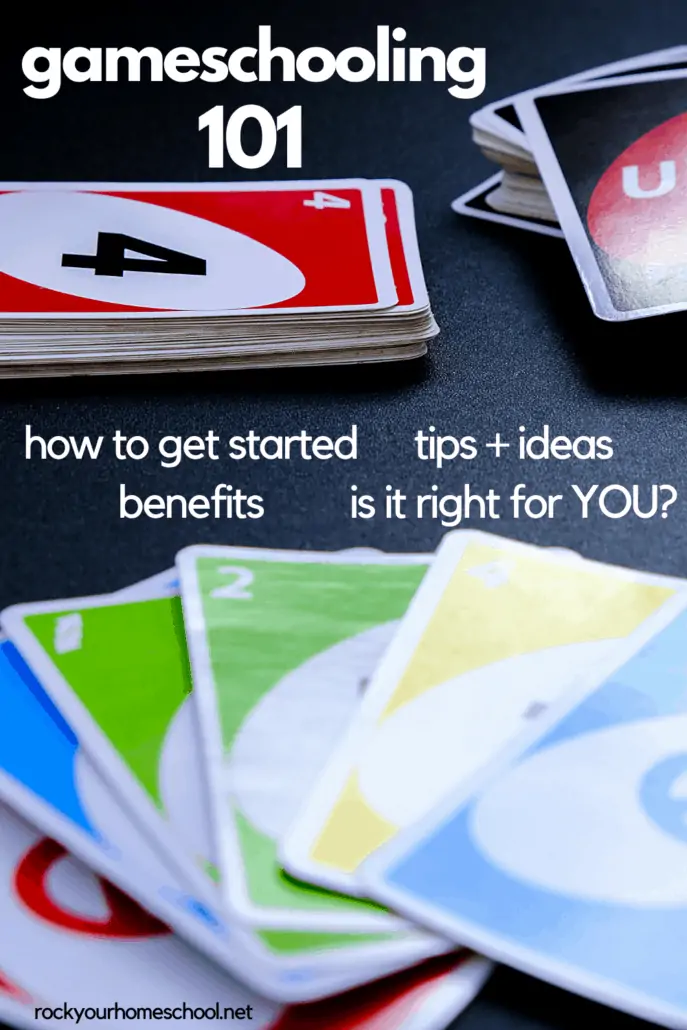
How to Add More Games Without Blowing Your Budget
As I mentioned, board games aren’t cheap. Some games cost as much as $60-70 each.
If you’re on a tight budget, you might feel like gameschooling isn’t possible for you. But, please don’t give up on it! It IS totally possible to gameschool on a budget without spending all of your extra cash on games.
Here are a few tips to expand your game collection AND not spend a ton of money:
1. Find Versatile Games
Do a bit of research and talk to other families that use games for homeschooling. What games do they recommend for different ages and stages?
If you can find games that cover more than one subject or skill, then those games should be added to your gameschool wishlist.
2. Start Small and Focus on Now
If you see a fantastic game that helps with multiplication, you might be tempted to buy it, but if your oldest is only five, wait.
Instead, start with games that your kids can play right now. Unless you get a a great deal on them!
Don’t be afraid to grab some classic games, like Candyland or even a deck of playing cards. These simple games can help your kids get used to the gameplay and taking turns.
3. Shop Second Hand
People buy board games all the time and never play them, or they only play them a few times.
Ask your friends if they have board games to sell.
Oh, and check thrift stores! You can find a ton of board games in very good condition.
4. Add Games to Wish Lists
Games are fantastic gifts.
When you start regularly playing games with your kids, they’ll love getting new ones for birthdays and other special events.
Start a tradition of giving games for birthdays and other holidays. It’s an easy way to build your game collection quickly.
5. Check Out Yard Sales
Yard sales are another gold mine for used board games on the cheap.
When I’m scouting yard sales, most games range from $1-10.
Make sure you double-check that the games have all of their pieces before leaving with the games.
Go Ahead and Give Gameschooling a Try!
If you’re still not sure if gameschooling if for you, I encourage you to give it a try.
Don’t be afraid to experiment and add a few games to your homeschool week. Make it a gradual process where you try one or two games a week and see how it turns out.
You may just discover that your family genuinely enjoys learning with board and card games.
Do you have any questions about getting started with gameschooling? Or would you like to know more about any of these ideas? Please let me know in the comments area below!
